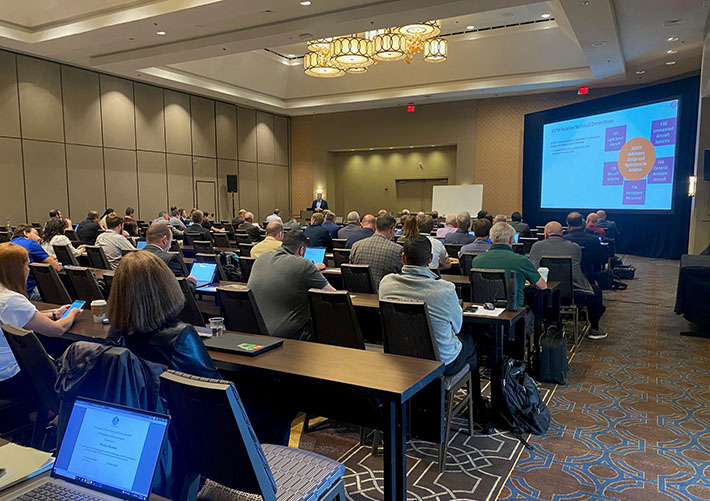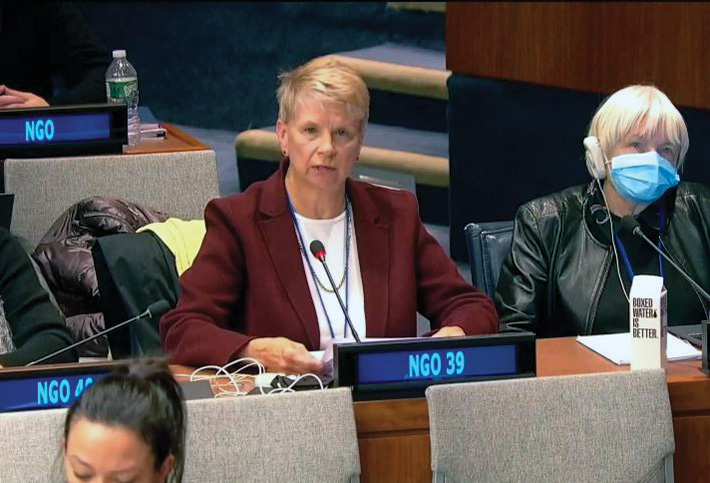Using Artificial Intelligence (AI) on ASTM standards and related intellectual property is prohibited. Violations will result in suspension of access.

Jan 03, 2023

The 2022 3rd Annual ASTM Autonomy in Aviation Symposium took place in October 2022. The event was themed “Autonomy for Good,” and it featured presentations from several institutions, including Garmin, Zipline, Matternet, and Wisk. Over 100 participants attended, representing academia, government, and industry leaders, and the symposium showcased the potential of autonomy to improve lives and the leadership role of ASTM in such efforts. Congressman Rick Larsen, chair of the House subcommittee on aviation, provided opening remarks for the event. Larson spoke of the importance of collaboration, noting, “Congress, industry, and the standards community must work together to ensure the future of aviation autonomy remains safe, equitable, innovative, and bright.” ASTM’s autonomy design and operations in aviation administrative committee (AC377) will follow the symposium with a publication, “Operational Control in the Age of Increasingly Autonomous Flight Operations,” expected in Spring 2023.

Teresa Cendrowska, ASTM’s vice president for global cooperation, discussed the importance of U.N. collaboration with non-governmental organizations in consultative status.
In December, Teresa Cendrowska, vice president for global cooperation, and Emmanuel Escoto, global cooperation’s manager for engagement, participated in the United Nations’ Economic and Social Committee’s (ECOSOC) Consultations with Non-government Organizations in Consultative Status with ECOSOC. Cendrowska presented a statement that:
ASTM was granted special consultative status to the U.N. in 2021. This status is granted to NGOs that have a special competence. It expands ASTM’s network and enables ASTM to make written and oral statements, as well as organize side events in conjunction with the ECOSOC.
The ECOSOC is the focal point for the three U.N. pillars of sustainable development (economic, social, and environmental) and coordinates the work of the 14 U.N. specialized agencies, ten functional commissions, and five regional commissions. It also issues policy recommendations to the U.N. system and to member states.
Global standards organization ASTM International and NEU: An American Concrete Institute Center of Excellence for Carbon-Neutral Concrete, have signed a memorandum of understanding (MoU) aimed at reducing and eliminating the carbon footprint of concrete in the built environment.
The MoU, signed by Lawrence Sutter, NEU board president, and Katharine Morgan, ASTM president, will allow both organizations to effectively and efficiently collaborate and reduce redundant efforts on issues related to carbon-neutral concrete.
Both ASTM and NEU agreed to collaborate and take action in the following activities:
“We are thrilled to partner with NEU to support sustainability on activities related to carbon-neutral concrete,” said Morgan. “We strongly believe this agreement will have a significant role in those efforts and we look forward to ongoing collaboration within the concrete industry.”
“NEU is excited to have ASTM as an Allied Organization,” said Sutter. “This partnership will be instrumental in accelerating the adoption of carbon-neutral concrete materials and technologies into standards for the construction industry. We value our partnership with ASTM and look forward to all we can achieve.”
As part of the MoU, ASTM became recognized as an Allied Organization of NEU, allowing for further collaboration within respective standards-development processes, facilitating technical standardization dialogue, conducting mutual outreach with key associations, and more.
Additionally, both parties will seek to leverage ASTM Xcellerate, an emerging technology program launched earlier this year, to advance NEU’s core functions. Potential joint activities could include coordinated funding sources for R&D, aligning technology and standards roadmaps, and program development, among others.
ASTM International recently held regional webinars in Africa and Latin America/the Caribbean on standard methods for testing for lead in paint.
The webinars, co-sponsored by the United Nations’ Environment Programme (UNEP) and the U.S. Environmental Protection Agency (EPA), are a part of a collaboration with the Global Alliance to Eliminate Lead Paint, jointly led by UNEP and the World Health Organization (WHO).
The objectives of both webinars were to provide:
Additionally, they aimed to help countries developing or implementing lead paint laws to understand which sample preparation and test methods are appropriate for their situation.
ASTM International has been granted a three-year guest status within the Asia-Pacific Economic Cooperation (APEC) subcommittee on standards and conformance (SCSC).
“We are honored to be granted guest status within APEC’s standards and conformance subcommittee,” notes Teresa Cendrowska, ASTM’s vice president for global cooperation. “ASTM has strong relationships and cooperation agreements with a majority of the APEC member economies and we look forward to additional participation and commitment within the region.”
APEC is a regional economic forum established to leverage the growing independence of the Asia-Pacific region. APEC’s 21 member economies aim to create greater prosperity for the region by accelerating economic integration through promotion of balanced, inclusive, sustainable, innovative, and secure growth.
The SCSC was established to help reduce the negative effects that differing standards and conformance agreements have on trade and investment that flows through the Asia-Pacific region.
Main objectives of the committee aim to:
Benefits associated with ASTM’s guest status include:
ASTM and APEC have collaborated successfully for over a decade, including most recently in 2021, when ASTM organized and managed two virtual APEC programs on reliable drone technology and additive manufacturing of PPE.
ASTM International Hosts Open House in Singapore
ASTM International’s global advanced manufacturing programs division recently held an open house at ASTM’s Singapore office, for key members, partners, and stakeholders in the region. The event served to bolster ASTM’s commitment to supporting the continued development of advanced manufacturing and other emerging technologies in Singapore and the Asia Region.
Supported by the Singapore Economic Development Board, the Singapore office and the global advanced manufacturing teams play a key strategic role by focusing on emerging areas such as additive manufacturing, robotics and automation, artificial intelligence and machine learning, data analytics, and cybersecurity.
“Under the leadership of Dr. Alex Liu, the advanced manufacturing team in the Singapore office provides knowledge and coordinates local and regional engagement in research to standards for emerging technologies, particularly advanced manufacturing in the Asia region,” said Mohsen Seifi, Ph.D., vice president of global advanced manufacturing programs.
“Across the region, we will continue to develop impactful programs, support initiatives, and progress together as one. In Singapore for instance, we have worked on local programs such as the SGUnited initiative and supported university internships in areas including robotics, automation, and digital twin, and we look forward to doing more in the advanced manufacturing
technologies area.”
In 2018, the National Additive Manufacturing Innovation Cluster (NAMIC) signed an agreement with ASTM, becoming the first in ASIA to join the ASTM Additive Manufacturing Center of Excellence (AM CoE) as a strategic partner. Under this strategic partnership, NAMIC coordinates the center’s R&D and related activities for the Asia-Pacific region, driving advancements and innovation in AM on a global scale. Several NAMIC-supported R&D projects have contributed to international AM standardization activities through the ASTM AM CoE, including two published standards, and several others currently under development.
In addition to the open house, ASTM also hosted a certificate course on Quality Assurance for Additive Manufacturing, while exhibiting at the Industrial Transformation Asia-Pacific (ITAP 2022), taking place Oct. 18-20, in Singapore.
Moving forward, ASTM will continue to deepen relationships, support research and innovation, and develop training and certification programs in advanced manufacturing. Liu, who previously served as ASTM’s head of additive manufacturing programs, will now take on a new role as head of advanced manufacturing programs, Asia region, supporting complementary technologies programs beyond additive manufacturing.
As part of ASTM’s strong and growing commitment to Singapore and the Asia region, the organization’s Board of Directors and management team will meet in Singapore on April 24-26, 2023. While there, they will host an event to formally open the Singapore office and introduce Elvin Chia, ASTM’s ASEAN representative. ■
January / February 2023